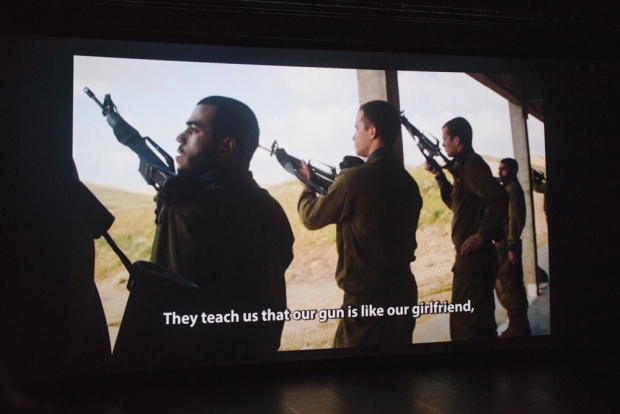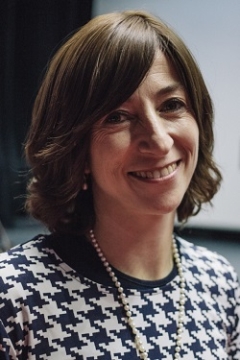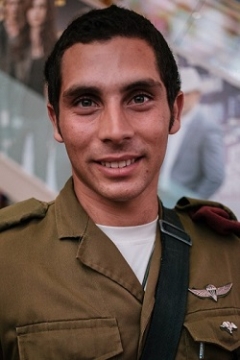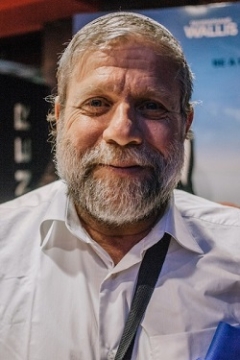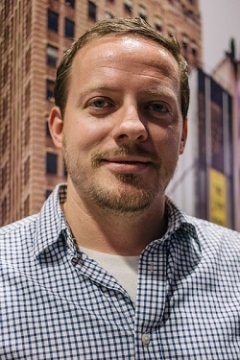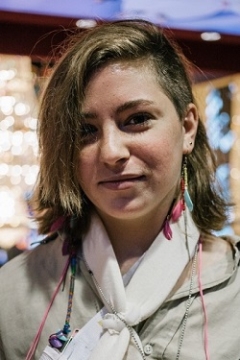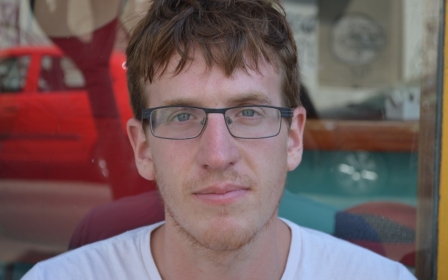Documentary aims to show the other side of Israeli soldiers

This past Saturday night, close to 600 filmgoers gathered at the Cinema City complex in Jerusalem to attend the Israeli premier of Beneath The Helmet, a documentary film showing Israeli youths entering their compulsory military service after graduating high school.
Described as a “coming of age story”, the film follows a handful of young draftees and the officer tasked with their training - who at 21 is only a few years older than those under his command - as they embark on their training to become combat paratroopers in the Israeli army.
The film’s goal is to humanise Israeli soldiers and follows the draftees off-base to their homes where they spend time with families and friends. It’s unlikely that Beneath The Helmet will change anyone’s opinions about the Israeli military, whether for or against. However, the film does provide some insight into the motivations of Israeli youth entering their mandatory military service and how, along with the practicalities of combat training, they are imbued with a sense of ideological and religious purpose; the lone guardians of a small Jewish nation surrounded by its enemies.
The filmmaker’s intend to screen the documentary at 100 campuses across the United States, to provide Jewish youth with real-life heroes that may inspire them to visit Israel and possibly even enlist as lone soldiers.
The film’s quick cuts and a bombastic soundtrack are clearly geared to attract a younger audience. The training process ends up looking like an extended stay at summer camp, albeit with more yelling, marching, and assault rifles.
The audience, almost all of them Israeli, gave a standing ovation after the screening, as soldiers from the film got up on stage for a Q and A session. Most of those in attendance saw the film as a way to address the negative-PR imposed upon the Israeli military by the foreign media in the aftermath of Operation Protective edge, which cost of the lives of 66 Israeli soldiers along with more than 2,100 Palestinians, including 500 children.
Rebecca Shore – Producer and writer of Beneath the Helmet
We wanted to show people [that] beneath every uniform and helmet here in Israel is an Israeli teenager who has a life. They have a family, they have passions and interests outside of the army. They’re serving in the army because they have to, it’s mandatory. They also don't have a choice because Israel is in a part of the world where we have to have an army to defend the country. We really felt that [this is] an opportunity to show a different side of Israelis. It's a point of view that isn’t being shared and it's an important thing to understand.
Of course we're expecting a backlash. Just to make a film about Israeli soldiers [is considered controversial] so that comes with the territory. But it's a completely apolitical film, it has nothing to do with the Israeli army policy per-e.
My primary target is young people – the Jewish youth - but we’re hoping everyone will relate to it, because it's a universal story. I want them to see that there are people just like them going through similar issues but have to face a whole other set of things that the average kid in America doesn't have to do. They should learn form that and [take home] lessons of responsibility, leadership, and Jewish pride.
First Lt. Eden Adler - Israeli soldier and the main subject of the documentary
I'm a soldier right now in the officer [training] school. I thought the movie was amazing, I never saw it before so that’s the first time.The movie was a true portrayal of the training and everything we had to go through to become soldiers. I'm really high right now from the movie. I really feel connected to everybody in the audience and the spirit that we have here is amazing.
Why this movie is important? There is not any choice for us for the Jewish people [about whether to fight or not]. I think right now is the time to get together and the movie brings us together.
I hope [it] brings people here to Israel to visit, to look, to do anything [they can for] Israel.
Moshe Kempiniski - Shopkeeper in the Old City, Jerusalem and Judaism Teacher
I think the film was very well done. I’ve had four kids in the army, three who have [gone through and finished their service]. The pain and difficulty of moving out of being just a regular person to doing this service was well [documented].It just speaks of an incredible power these people have to come out of a normal humdrum existence [and] suddenly do something much more noble than you ever would have thought they'd be doing.
[The film] will have a big impact in the Jewish community. In the non-Jewish community that supports us, they’ll be moved as well. In the community that doesn't really get what’s going on here, that’s already been warped [in] its understanding, I don't know how much effect it will have. [The documentary] didn't talk about the IDF's high level of moral behaviour during warfare - that wasn't the point of this movie.
But I think it will give them a little sense of the people, that they see as the enemy - as child killers - are human beings. These are young teenagers that truly believe that they're here to protect their families. That may move them a little and that would be a great accomplishment.
Yosi Polak – Former soldier, now in tech sales
I thought the film was very inspirational. It was a great film. I felt very emotional as well during it. I myself served in the military here in Israel, in the tank corps, and it was just good to have a feeling of being connected once again to what we’re all fighting for here and what we're defending and how our unity is our strength.I think we have a big rise now of anti-Semitism all across the world and it's very important, especially now after the last war, Protective Edge.
The world really didn't see Israel in a very positive light, as always.
[There was more attention on the] death toll of the Palestinians, rather than trying to better understand what happened during the war.
I feel like we're always on the defensive and the other side is very good at pitching their side of the story. So I think it’s very important now to show we're not here to kill Palestinians or murder people. We're here to defend our country from enemies.
So we always need to be prepared. We’re always on our toes, we're always on the edge.
Alizah Shore - High School Student in her last year before military service
I think [the film] was awesome. I don’t think most people know what Israel is going through and what these little kids have to go through when they go to the army.They’re babies and they have to go out and protect Israel. And then instead of getting the respect they should be getting, they're actually getting backlash. People are criticising everything that they do and I think that that's terrible and should change. Hopefully this movie will help that because Israel needs all the support it can get.
New MEE newsletter: Jerusalem Dispatch
Sign up to get the latest insights and analysis on Israel-Palestine, alongside Turkey Unpacked and other MEE newsletters
Middle East Eye delivers independent and unrivalled coverage and analysis of the Middle East, North Africa and beyond. To learn more about republishing this content and the associated fees, please fill out this form. More about MEE can be found here.


